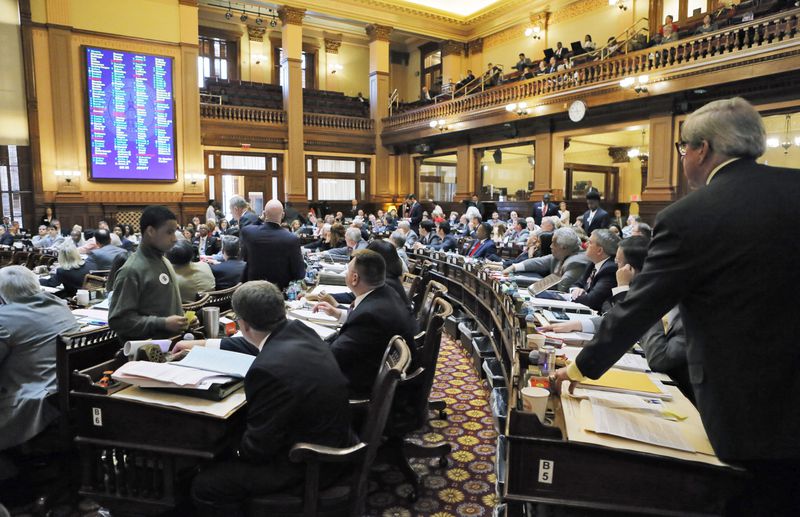The leaders of the Georgia House and Senate are re-evaluating how they handle sexual harassment at the state Capitol in response to nationwide allegations of inappropriate conduct by politicians and media figures.
House Speaker David Ralston and Lt. Gov. Casey Cagle recently created a subcommittee to review internal rules for elected officials' behavior.
The subcommittee, made up of three senators and three representatives, includes just one woman: its chairwoman, House Speaker Pro-Tem Jan Jones, R-Milton.
Ralston said the Georgia General Assembly's rules allow "zero tolerance" for sexual harassment, but they could be improved. He said he's unaware of any complaints filed against state representatives or lobbyists since he took leadership of the House in 2010.
Credit: Bob Andres
Credit: Bob Andres
“I can assure you that if those issues surface, they’ll be dealt with in a very serious way,” Ralston said Wednesday during an interview with The Atlanta Journal-Constitution. “Anyone that is in a position of responsibility has to be aware that’s a very serious issue and has to be approached that way.”
Cagle’s office said he's unaware of any complaints filed against members of the Senate.
An outside attorney specializing in employment law will review and recommend potential improvements to sexual harassment policies, according to a statement Friday from Cagle and Ralston. That attorney, Tashwanda Pinchback Dixon of the Balch & Bingham law firm, will suggest potential changes to House and Senate rules that could be implemented through the bipartisan Legislative Services Committee.
“No industry or workplace has a monopoly on the problem,” said House Minority Leader Bob Trammell, D-Luthersville, a member of the committee. “It’s something we have to be proactive about. The subcommittee was created in an effort to stay ahead of the curve on that issue.”
The Georgia Legislature approved rules in 2010 that prohibit sexual harassment. Those rules, which remain in place, ban sexual advances, requests for sexual favors and other conduct of a sexual nature when they affect an individual’s employment, interfere with work performance or create an intimidating or hostile work environment.
Harassment complaints can be filed with House or Senate ethics committees, which have the power to review evidence and report findings. Documents gathered by these ethics committees aren’t public records except when released as part of their official reported findings when “substantial evidence” exists, according to each chamber’s rules. The Georgia Constitution allows the House and Senate to issue censures and fines, or to expel a legislator by a two-thirds vote.
Sexual harassment rules were created after Glenn Richardson resigned as House speaker in 2009 after his ex-wife accused him of participating in an affair with a female lobbyist.
Former state Rep. LaDawn Jones said the rules should require training on sexual harassment, especially to protect women at events and lobbying dinners where legislators are consuming alcohol.
She also said the subcommittee should have included more women than just Jones, who was out of the country and unavailable for comment Friday. About 27 percent of state legislators are women — 63 of 236 members in the state House and Senate combined.
“We should make it clear that things that happen off the clock are as serious as those on the clock,” Jones said. “We need direct and clear training on what is sexual harassment, what is sexual assault and what are the distinctions between people in positions in authority compared to subordinates.”
Jones, an attorney, said she wasn’t harassed or assaulted during her four years in the General Assembly, but she fears that others have been.
“It would be ridiculous to think this is pervasive at the federal level and in the entertainment industry and think it isn’t happening here as well,” she said.
The subcommittee reviewing harassment policies was formed in November but won’t hold its first meeting until the outside attorney’s review is finished. The timeline and cost for the legal evaluation hasn’t been announced.
Staff writer Maya Prabhu contributed to this article.
Never miss a minute of what’s happening in Georgia Politics. Subscribe to PoliticallyGeorgia.com.
About the Author








